Management Ethics and Governance: A Case Study Report
VerifiedAdded on 2023/02/01
|16
|4112
|20
Report
AI Summary
This report delves into the critical role of ethics in corporate governance, emphasizing its value in the workplace. It examines the Aristotelian concept of virtue ethics and the application of utilitarianism in analyzing ethical dilemmas, particularly in the context of financial services. The report uses a case study involving Freedom, its customers, and the implications of their actions. It analyzes issues such as the asymmetry of power and information, conflicts of interest, and the importance of accountability. The discussion covers ethical issues in corporate governance, theoretical considerations, and the practical application of utility theory. The report also assesses the implications of corporate actions, such as the sale of insurance policies and the handling of customer complaints, in the context of ethical standards and legal requirements. The report concludes by highlighting the importance of transparency, ethical behavior, and adherence to regulatory frameworks for maintaining customer trust and ensuring responsible corporate governance.
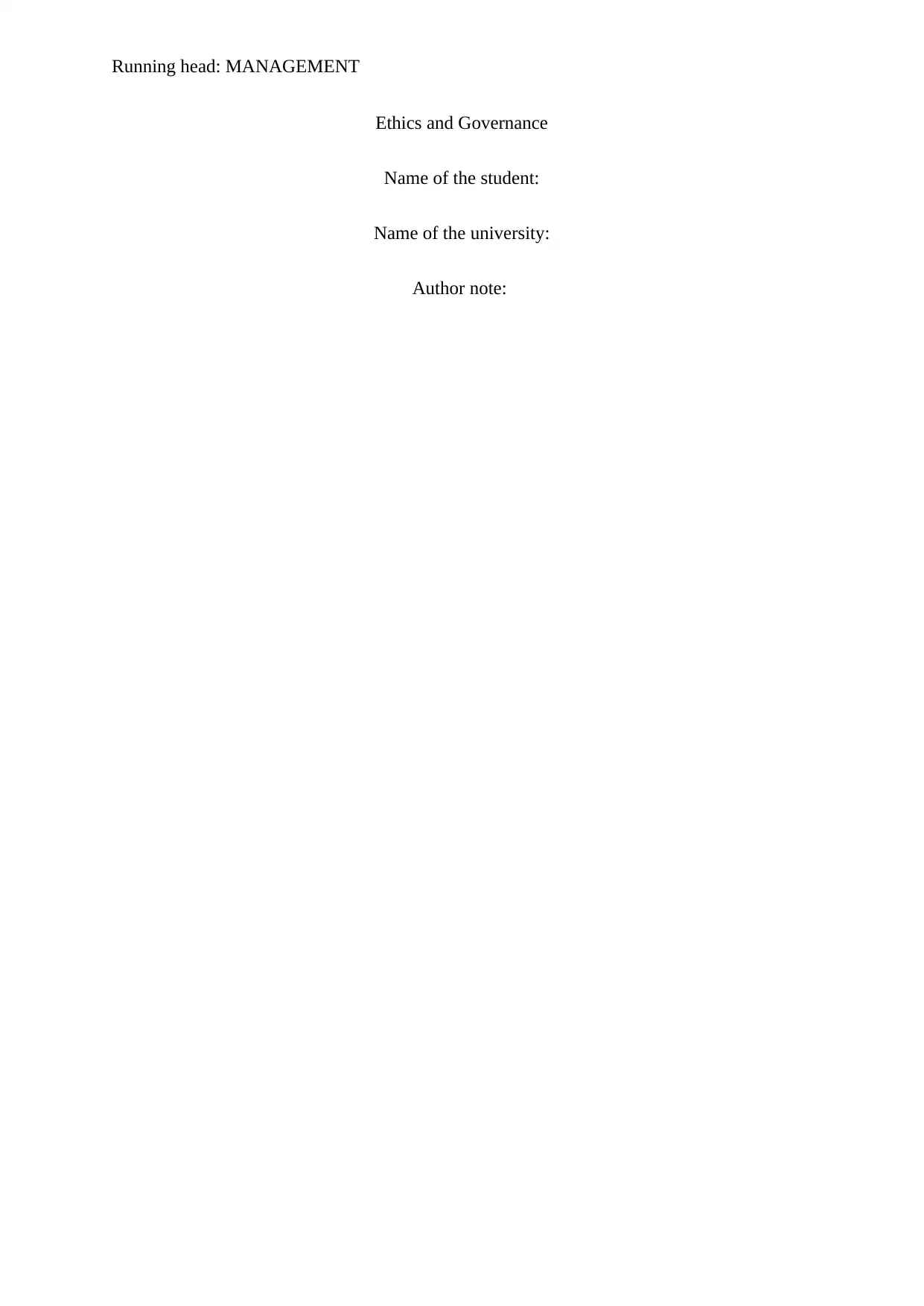
Running head: MANAGEMENT
Ethics and Governance
Name of the student:
Name of the university:
Author note:
Ethics and Governance
Name of the student:
Name of the university:
Author note:
Paraphrase This Document
Need a fresh take? Get an instant paraphrase of this document with our AI Paraphraser
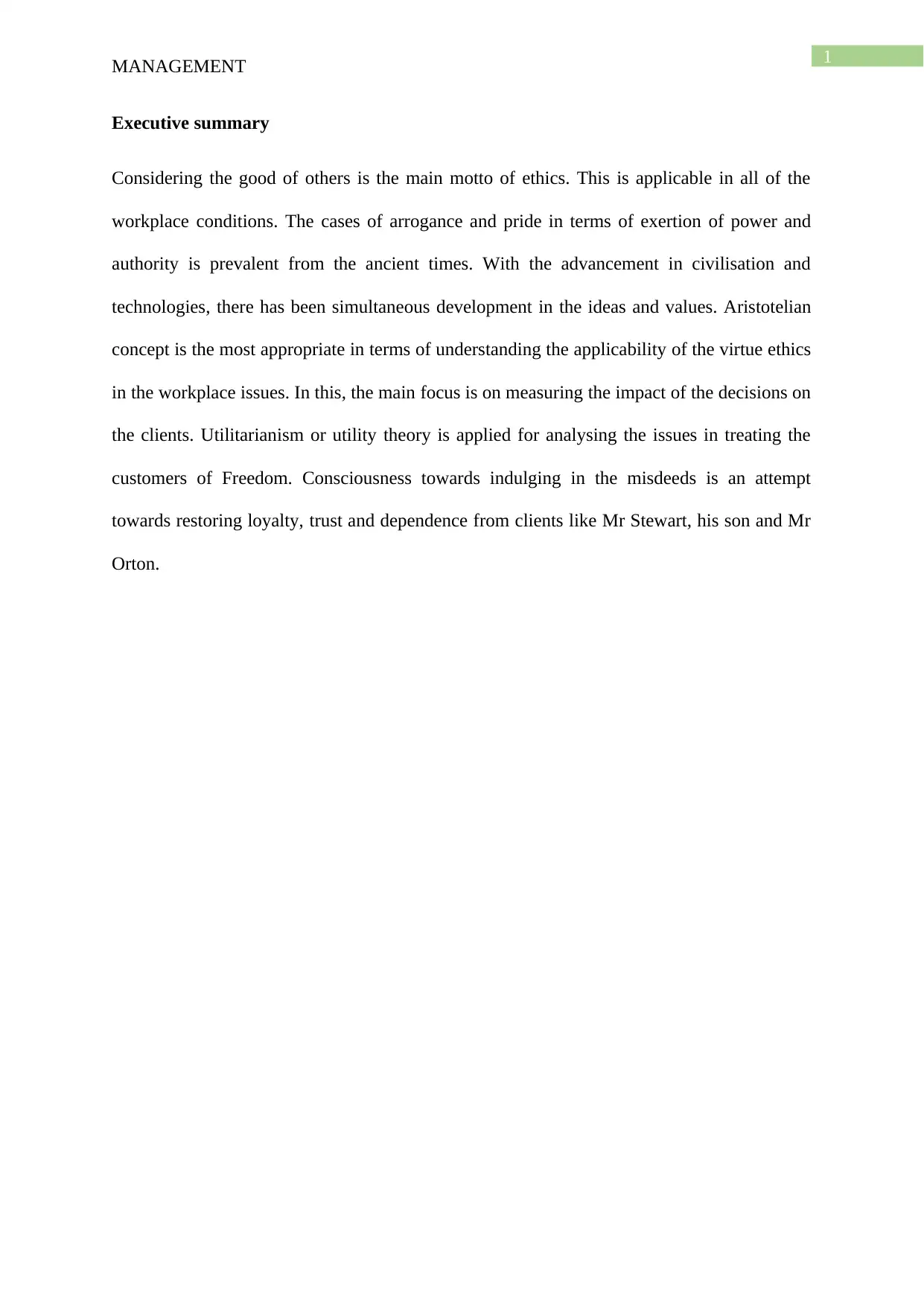
1
MANAGEMENT
Executive summary
Considering the good of others is the main motto of ethics. This is applicable in all of the
workplace conditions. The cases of arrogance and pride in terms of exertion of power and
authority is prevalent from the ancient times. With the advancement in civilisation and
technologies, there has been simultaneous development in the ideas and values. Aristotelian
concept is the most appropriate in terms of understanding the applicability of the virtue ethics
in the workplace issues. In this, the main focus is on measuring the impact of the decisions on
the clients. Utilitarianism or utility theory is applied for analysing the issues in treating the
customers of Freedom. Consciousness towards indulging in the misdeeds is an attempt
towards restoring loyalty, trust and dependence from clients like Mr Stewart, his son and Mr
Orton.
MANAGEMENT
Executive summary
Considering the good of others is the main motto of ethics. This is applicable in all of the
workplace conditions. The cases of arrogance and pride in terms of exertion of power and
authority is prevalent from the ancient times. With the advancement in civilisation and
technologies, there has been simultaneous development in the ideas and values. Aristotelian
concept is the most appropriate in terms of understanding the applicability of the virtue ethics
in the workplace issues. In this, the main focus is on measuring the impact of the decisions on
the clients. Utilitarianism or utility theory is applied for analysing the issues in treating the
customers of Freedom. Consciousness towards indulging in the misdeeds is an attempt
towards restoring loyalty, trust and dependence from clients like Mr Stewart, his son and Mr
Orton.
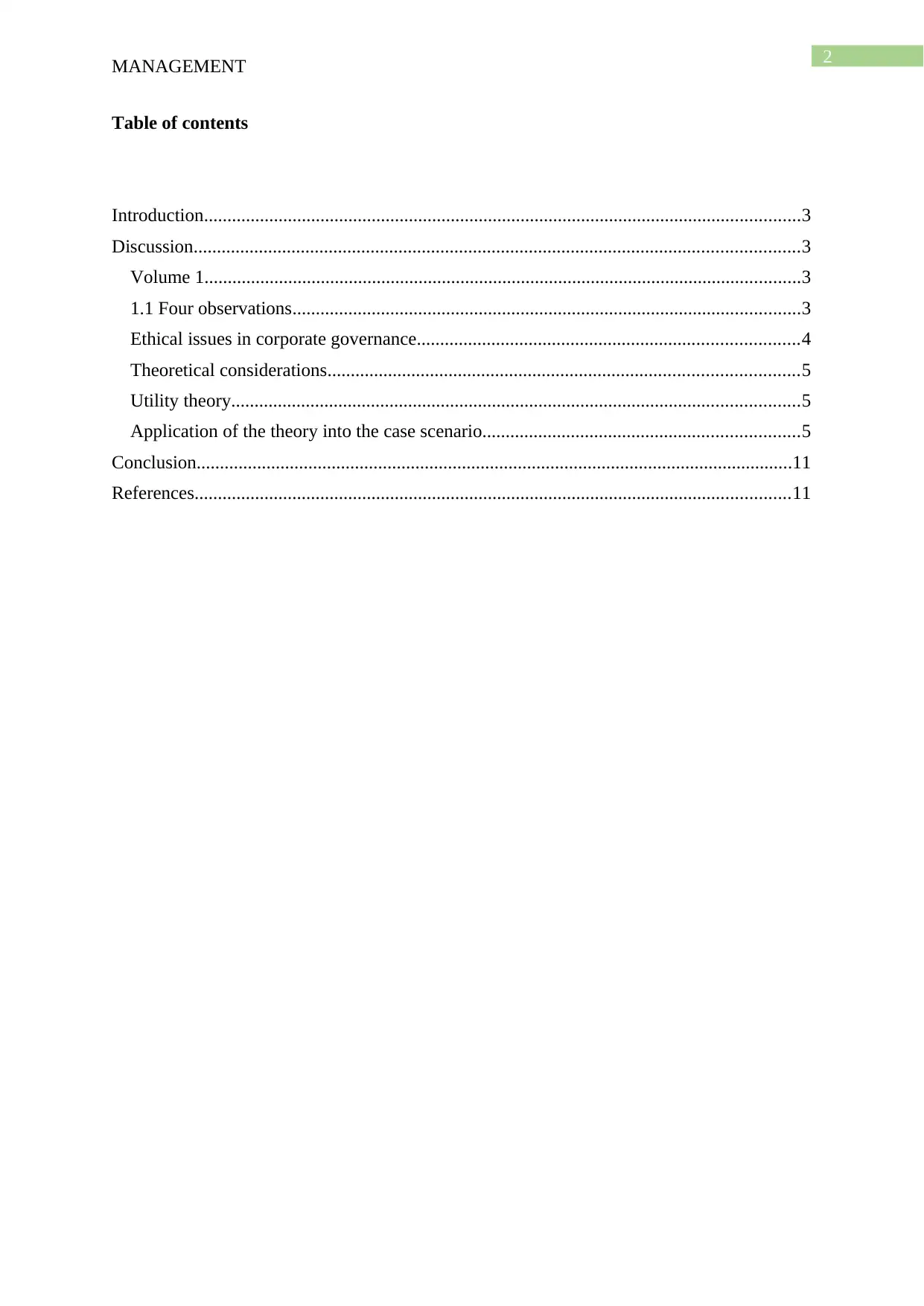
2
MANAGEMENT
Table of contents
Introduction................................................................................................................................3
Discussion..................................................................................................................................3
Volume 1................................................................................................................................3
1.1 Four observations.............................................................................................................3
Ethical issues in corporate governance..................................................................................4
Theoretical considerations.....................................................................................................5
Utility theory..........................................................................................................................5
Application of the theory into the case scenario....................................................................5
Conclusion................................................................................................................................11
References................................................................................................................................11
MANAGEMENT
Table of contents
Introduction................................................................................................................................3
Discussion..................................................................................................................................3
Volume 1................................................................................................................................3
1.1 Four observations.............................................................................................................3
Ethical issues in corporate governance..................................................................................4
Theoretical considerations.....................................................................................................5
Utility theory..........................................................................................................................5
Application of the theory into the case scenario....................................................................5
Conclusion................................................................................................................................11
References................................................................................................................................11
⊘ This is a preview!⊘
Do you want full access?
Subscribe today to unlock all pages.

Trusted by 1+ million students worldwide
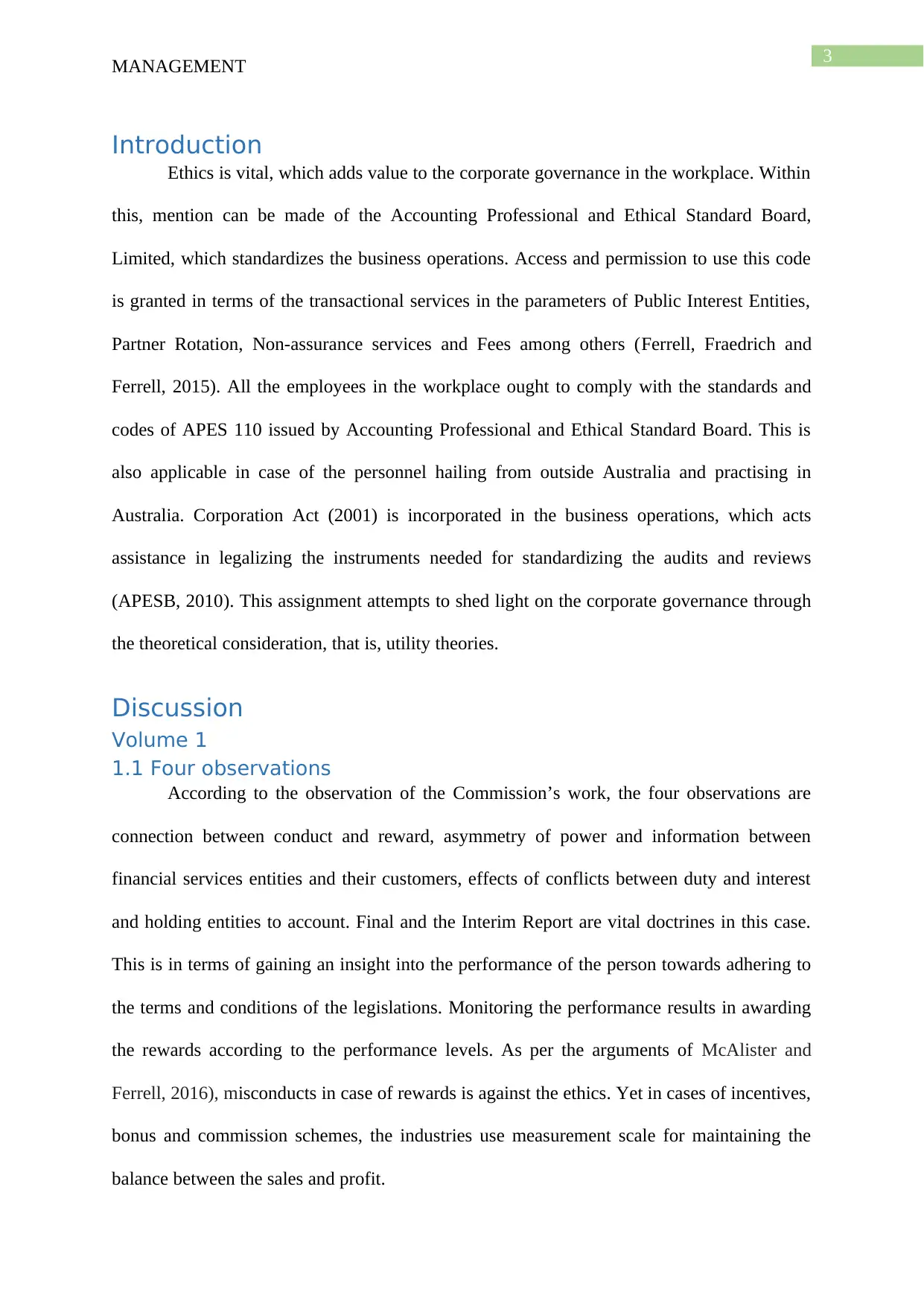
3
MANAGEMENT
Introduction
Ethics is vital, which adds value to the corporate governance in the workplace. Within
this, mention can be made of the Accounting Professional and Ethical Standard Board,
Limited, which standardizes the business operations. Access and permission to use this code
is granted in terms of the transactional services in the parameters of Public Interest Entities,
Partner Rotation, Non-assurance services and Fees among others (Ferrell, Fraedrich and
Ferrell, 2015). All the employees in the workplace ought to comply with the standards and
codes of APES 110 issued by Accounting Professional and Ethical Standard Board. This is
also applicable in case of the personnel hailing from outside Australia and practising in
Australia. Corporation Act (2001) is incorporated in the business operations, which acts
assistance in legalizing the instruments needed for standardizing the audits and reviews
(APESB, 2010). This assignment attempts to shed light on the corporate governance through
the theoretical consideration, that is, utility theories.
Discussion
Volume 1
1.1 Four observations
According to the observation of the Commission’s work, the four observations are
connection between conduct and reward, asymmetry of power and information between
financial services entities and their customers, effects of conflicts between duty and interest
and holding entities to account. Final and the Interim Report are vital doctrines in this case.
This is in terms of gaining an insight into the performance of the person towards adhering to
the terms and conditions of the legislations. Monitoring the performance results in awarding
the rewards according to the performance levels. As per the arguments of McAlister and
Ferrell, 2016), misconducts in case of rewards is against the ethics. Yet in cases of incentives,
bonus and commission schemes, the industries use measurement scale for maintaining the
balance between the sales and profit.
MANAGEMENT
Introduction
Ethics is vital, which adds value to the corporate governance in the workplace. Within
this, mention can be made of the Accounting Professional and Ethical Standard Board,
Limited, which standardizes the business operations. Access and permission to use this code
is granted in terms of the transactional services in the parameters of Public Interest Entities,
Partner Rotation, Non-assurance services and Fees among others (Ferrell, Fraedrich and
Ferrell, 2015). All the employees in the workplace ought to comply with the standards and
codes of APES 110 issued by Accounting Professional and Ethical Standard Board. This is
also applicable in case of the personnel hailing from outside Australia and practising in
Australia. Corporation Act (2001) is incorporated in the business operations, which acts
assistance in legalizing the instruments needed for standardizing the audits and reviews
(APESB, 2010). This assignment attempts to shed light on the corporate governance through
the theoretical consideration, that is, utility theories.
Discussion
Volume 1
1.1 Four observations
According to the observation of the Commission’s work, the four observations are
connection between conduct and reward, asymmetry of power and information between
financial services entities and their customers, effects of conflicts between duty and interest
and holding entities to account. Final and the Interim Report are vital doctrines in this case.
This is in terms of gaining an insight into the performance of the person towards adhering to
the terms and conditions of the legislations. Monitoring the performance results in awarding
the rewards according to the performance levels. As per the arguments of McAlister and
Ferrell, 2016), misconducts in case of rewards is against the ethics. Yet in cases of incentives,
bonus and commission schemes, the industries use measurement scale for maintaining the
balance between the sales and profit.
Paraphrase This Document
Need a fresh take? Get an instant paraphrase of this document with our AI Paraphraser
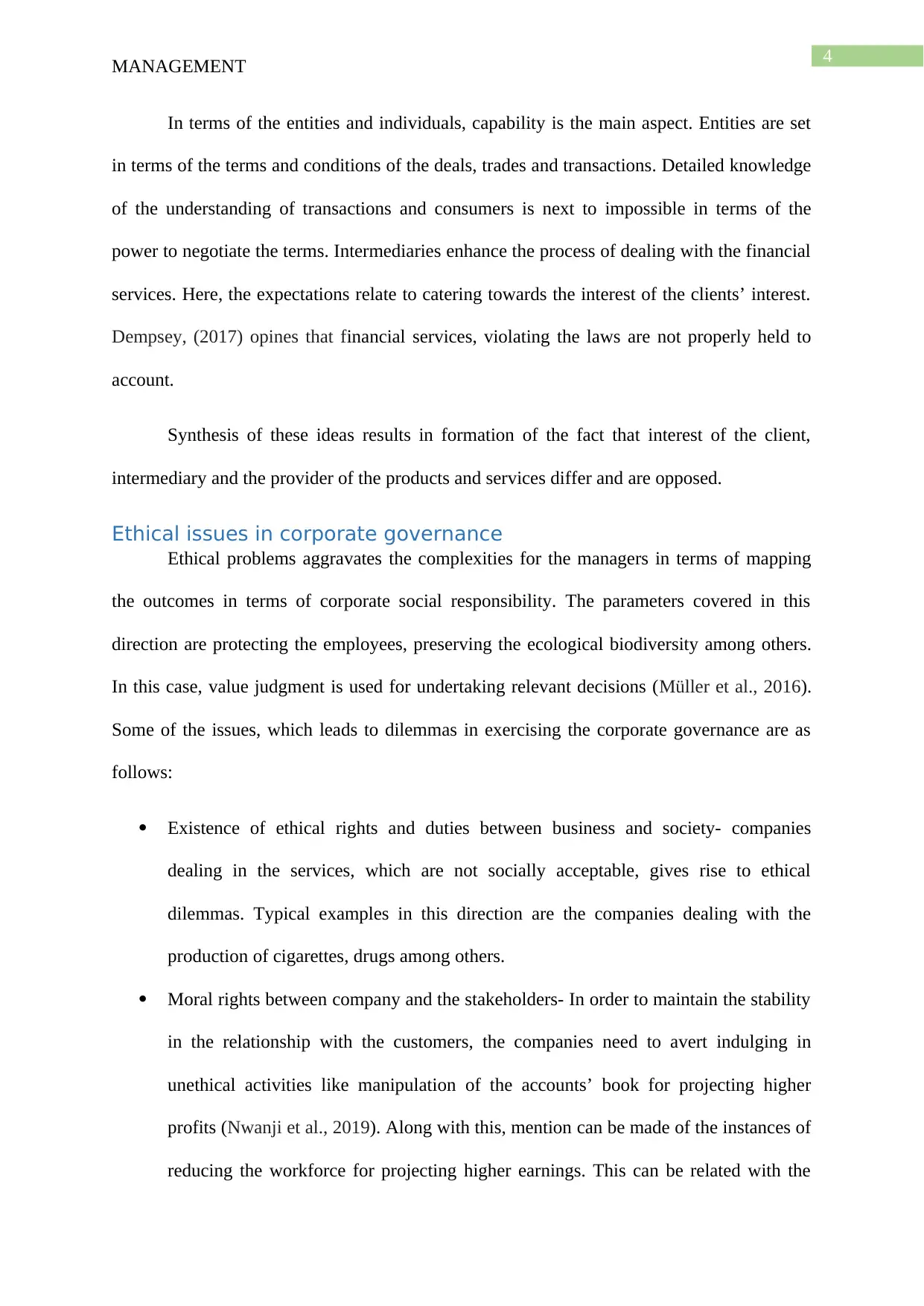
4
MANAGEMENT
In terms of the entities and individuals, capability is the main aspect. Entities are set
in terms of the terms and conditions of the deals, trades and transactions. Detailed knowledge
of the understanding of transactions and consumers is next to impossible in terms of the
power to negotiate the terms. Intermediaries enhance the process of dealing with the financial
services. Here, the expectations relate to catering towards the interest of the clients’ interest.
Dempsey, (2017) opines that financial services, violating the laws are not properly held to
account.
Synthesis of these ideas results in formation of the fact that interest of the client,
intermediary and the provider of the products and services differ and are opposed.
Ethical issues in corporate governance
Ethical problems aggravates the complexities for the managers in terms of mapping
the outcomes in terms of corporate social responsibility. The parameters covered in this
direction are protecting the employees, preserving the ecological biodiversity among others.
In this case, value judgment is used for undertaking relevant decisions (Müller et al., 2016).
Some of the issues, which leads to dilemmas in exercising the corporate governance are as
follows:
Existence of ethical rights and duties between business and society- companies
dealing in the services, which are not socially acceptable, gives rise to ethical
dilemmas. Typical examples in this direction are the companies dealing with the
production of cigarettes, drugs among others.
Moral rights between company and the stakeholders- In order to maintain the stability
in the relationship with the customers, the companies need to avert indulging in
unethical activities like manipulation of the accounts’ book for projecting higher
profits (Nwanji et al., 2019). Along with this, mention can be made of the instances of
reducing the workforce for projecting higher earnings. This can be related with the
MANAGEMENT
In terms of the entities and individuals, capability is the main aspect. Entities are set
in terms of the terms and conditions of the deals, trades and transactions. Detailed knowledge
of the understanding of transactions and consumers is next to impossible in terms of the
power to negotiate the terms. Intermediaries enhance the process of dealing with the financial
services. Here, the expectations relate to catering towards the interest of the clients’ interest.
Dempsey, (2017) opines that financial services, violating the laws are not properly held to
account.
Synthesis of these ideas results in formation of the fact that interest of the client,
intermediary and the provider of the products and services differ and are opposed.
Ethical issues in corporate governance
Ethical problems aggravates the complexities for the managers in terms of mapping
the outcomes in terms of corporate social responsibility. The parameters covered in this
direction are protecting the employees, preserving the ecological biodiversity among others.
In this case, value judgment is used for undertaking relevant decisions (Müller et al., 2016).
Some of the issues, which leads to dilemmas in exercising the corporate governance are as
follows:
Existence of ethical rights and duties between business and society- companies
dealing in the services, which are not socially acceptable, gives rise to ethical
dilemmas. Typical examples in this direction are the companies dealing with the
production of cigarettes, drugs among others.
Moral rights between company and the stakeholders- In order to maintain the stability
in the relationship with the customers, the companies need to avert indulging in
unethical activities like manipulation of the accounts’ book for projecting higher
profits (Nwanji et al., 2019). Along with this, mention can be made of the instances of
reducing the workforce for projecting higher earnings. This can be related with the
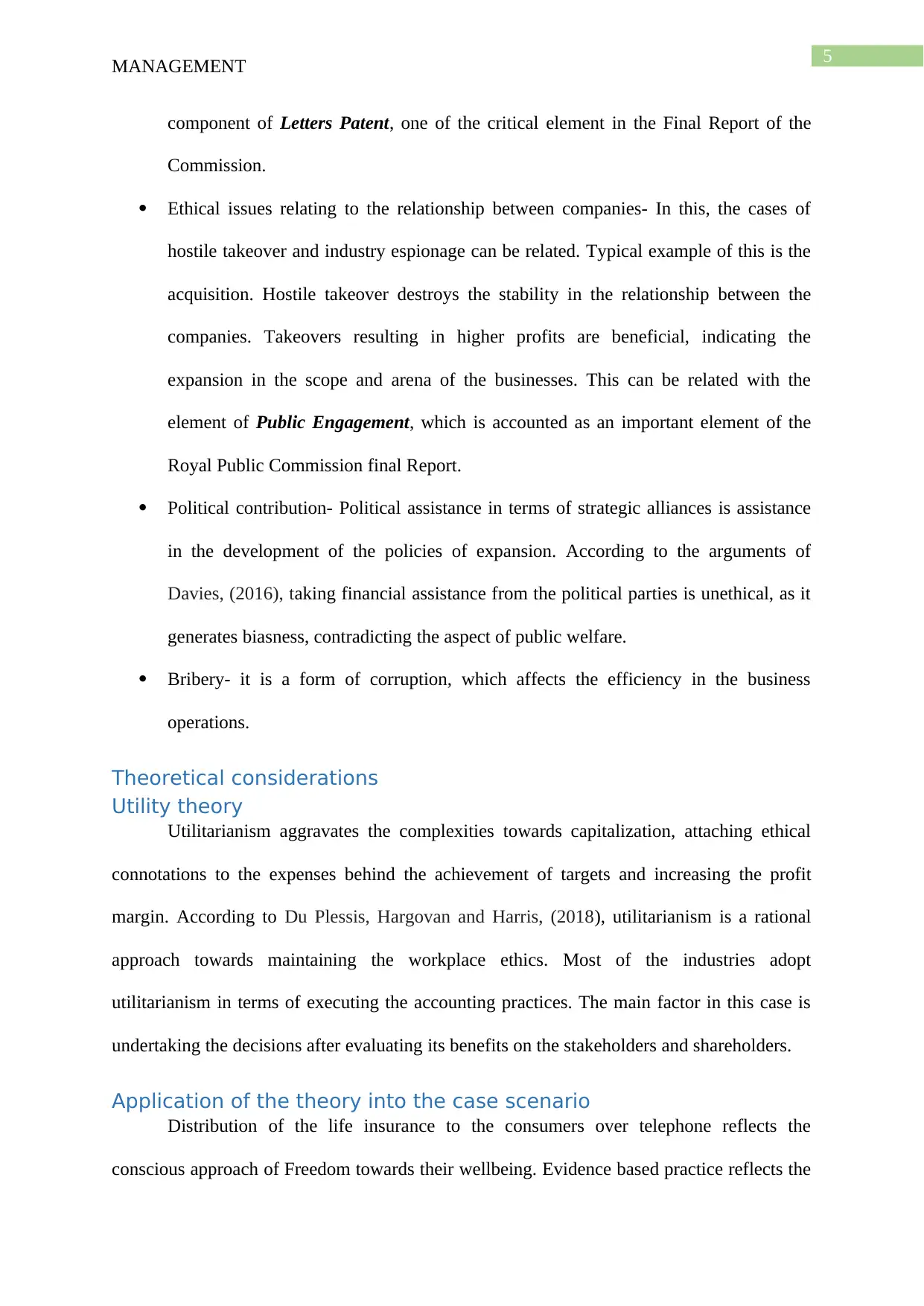
5
MANAGEMENT
component of Letters Patent, one of the critical element in the Final Report of the
Commission.
Ethical issues relating to the relationship between companies- In this, the cases of
hostile takeover and industry espionage can be related. Typical example of this is the
acquisition. Hostile takeover destroys the stability in the relationship between the
companies. Takeovers resulting in higher profits are beneficial, indicating the
expansion in the scope and arena of the businesses. This can be related with the
element of Public Engagement, which is accounted as an important element of the
Royal Public Commission final Report.
Political contribution- Political assistance in terms of strategic alliances is assistance
in the development of the policies of expansion. According to the arguments of
Davies, (2016), taking financial assistance from the political parties is unethical, as it
generates biasness, contradicting the aspect of public welfare.
Bribery- it is a form of corruption, which affects the efficiency in the business
operations.
Theoretical considerations
Utility theory
Utilitarianism aggravates the complexities towards capitalization, attaching ethical
connotations to the expenses behind the achievement of targets and increasing the profit
margin. According to Du Plessis, Hargovan and Harris, (2018), utilitarianism is a rational
approach towards maintaining the workplace ethics. Most of the industries adopt
utilitarianism in terms of executing the accounting practices. The main factor in this case is
undertaking the decisions after evaluating its benefits on the stakeholders and shareholders.
Application of the theory into the case scenario
Distribution of the life insurance to the consumers over telephone reflects the
conscious approach of Freedom towards their wellbeing. Evidence based practice reflects the
MANAGEMENT
component of Letters Patent, one of the critical element in the Final Report of the
Commission.
Ethical issues relating to the relationship between companies- In this, the cases of
hostile takeover and industry espionage can be related. Typical example of this is the
acquisition. Hostile takeover destroys the stability in the relationship between the
companies. Takeovers resulting in higher profits are beneficial, indicating the
expansion in the scope and arena of the businesses. This can be related with the
element of Public Engagement, which is accounted as an important element of the
Royal Public Commission final Report.
Political contribution- Political assistance in terms of strategic alliances is assistance
in the development of the policies of expansion. According to the arguments of
Davies, (2016), taking financial assistance from the political parties is unethical, as it
generates biasness, contradicting the aspect of public welfare.
Bribery- it is a form of corruption, which affects the efficiency in the business
operations.
Theoretical considerations
Utility theory
Utilitarianism aggravates the complexities towards capitalization, attaching ethical
connotations to the expenses behind the achievement of targets and increasing the profit
margin. According to Du Plessis, Hargovan and Harris, (2018), utilitarianism is a rational
approach towards maintaining the workplace ethics. Most of the industries adopt
utilitarianism in terms of executing the accounting practices. The main factor in this case is
undertaking the decisions after evaluating its benefits on the stakeholders and shareholders.
Application of the theory into the case scenario
Distribution of the life insurance to the consumers over telephone reflects the
conscious approach of Freedom towards their wellbeing. Evidence based practice reflects the
⊘ This is a preview!⊘
Do you want full access?
Subscribe today to unlock all pages.

Trusted by 1+ million students worldwide
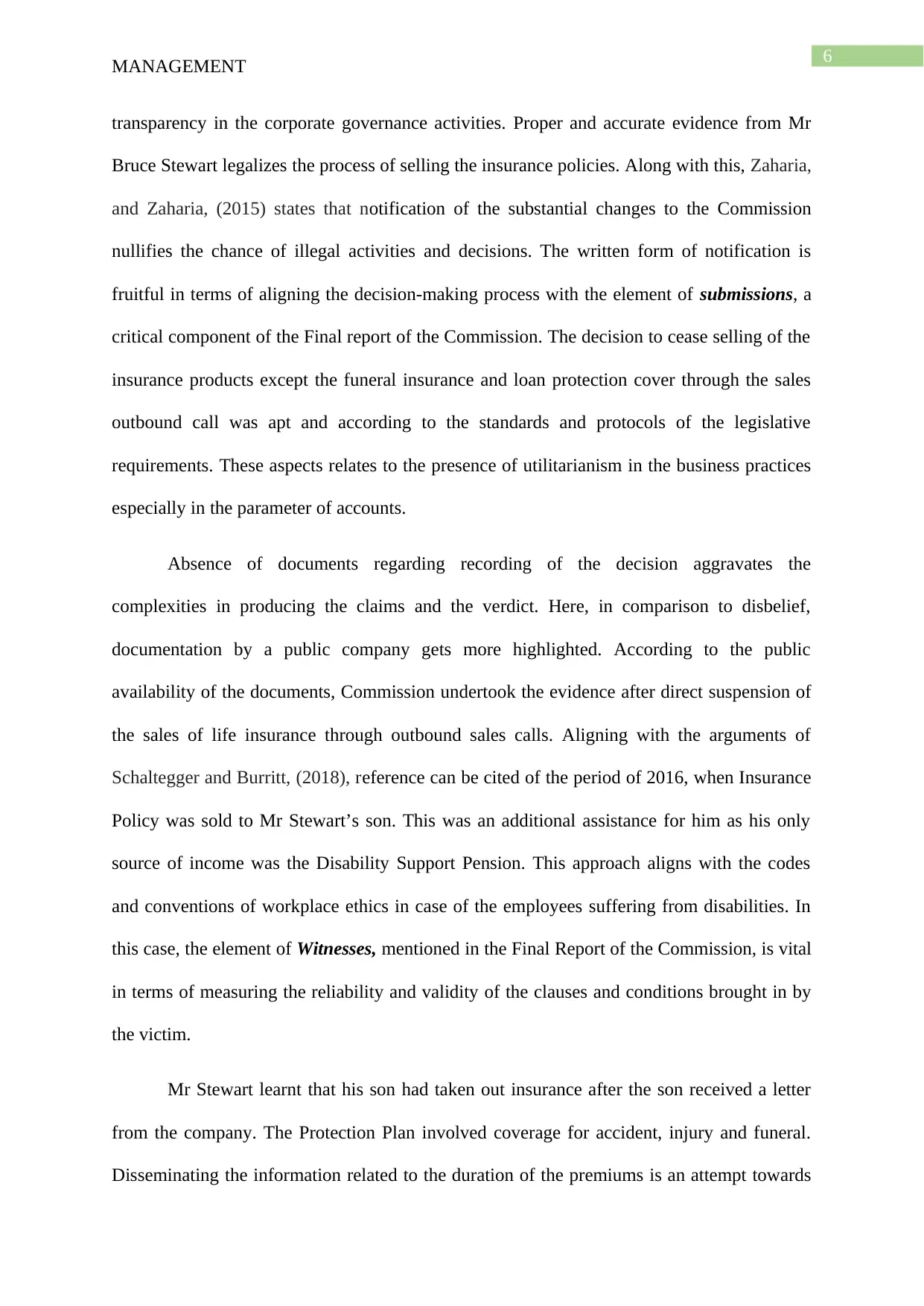
6
MANAGEMENT
transparency in the corporate governance activities. Proper and accurate evidence from Mr
Bruce Stewart legalizes the process of selling the insurance policies. Along with this, Zaharia,
and Zaharia, (2015) states that notification of the substantial changes to the Commission
nullifies the chance of illegal activities and decisions. The written form of notification is
fruitful in terms of aligning the decision-making process with the element of submissions, a
critical component of the Final report of the Commission. The decision to cease selling of the
insurance products except the funeral insurance and loan protection cover through the sales
outbound call was apt and according to the standards and protocols of the legislative
requirements. These aspects relates to the presence of utilitarianism in the business practices
especially in the parameter of accounts.
Absence of documents regarding recording of the decision aggravates the
complexities in producing the claims and the verdict. Here, in comparison to disbelief,
documentation by a public company gets more highlighted. According to the public
availability of the documents, Commission undertook the evidence after direct suspension of
the sales of life insurance through outbound sales calls. Aligning with the arguments of
Schaltegger and Burritt, (2018), reference can be cited of the period of 2016, when Insurance
Policy was sold to Mr Stewart’s son. This was an additional assistance for him as his only
source of income was the Disability Support Pension. This approach aligns with the codes
and conventions of workplace ethics in case of the employees suffering from disabilities. In
this case, the element of Witnesses, mentioned in the Final Report of the Commission, is vital
in terms of measuring the reliability and validity of the clauses and conditions brought in by
the victim.
Mr Stewart learnt that his son had taken out insurance after the son received a letter
from the company. The Protection Plan involved coverage for accident, injury and funeral.
Disseminating the information related to the duration of the premiums is an attempt towards
MANAGEMENT
transparency in the corporate governance activities. Proper and accurate evidence from Mr
Bruce Stewart legalizes the process of selling the insurance policies. Along with this, Zaharia,
and Zaharia, (2015) states that notification of the substantial changes to the Commission
nullifies the chance of illegal activities and decisions. The written form of notification is
fruitful in terms of aligning the decision-making process with the element of submissions, a
critical component of the Final report of the Commission. The decision to cease selling of the
insurance products except the funeral insurance and loan protection cover through the sales
outbound call was apt and according to the standards and protocols of the legislative
requirements. These aspects relates to the presence of utilitarianism in the business practices
especially in the parameter of accounts.
Absence of documents regarding recording of the decision aggravates the
complexities in producing the claims and the verdict. Here, in comparison to disbelief,
documentation by a public company gets more highlighted. According to the public
availability of the documents, Commission undertook the evidence after direct suspension of
the sales of life insurance through outbound sales calls. Aligning with the arguments of
Schaltegger and Burritt, (2018), reference can be cited of the period of 2016, when Insurance
Policy was sold to Mr Stewart’s son. This was an additional assistance for him as his only
source of income was the Disability Support Pension. This approach aligns with the codes
and conventions of workplace ethics in case of the employees suffering from disabilities. In
this case, the element of Witnesses, mentioned in the Final Report of the Commission, is vital
in terms of measuring the reliability and validity of the clauses and conditions brought in by
the victim.
Mr Stewart learnt that his son had taken out insurance after the son received a letter
from the company. The Protection Plan involved coverage for accident, injury and funeral.
Disseminating the information related to the duration of the premiums is an attempt towards
Paraphrase This Document
Need a fresh take? Get an instant paraphrase of this document with our AI Paraphraser
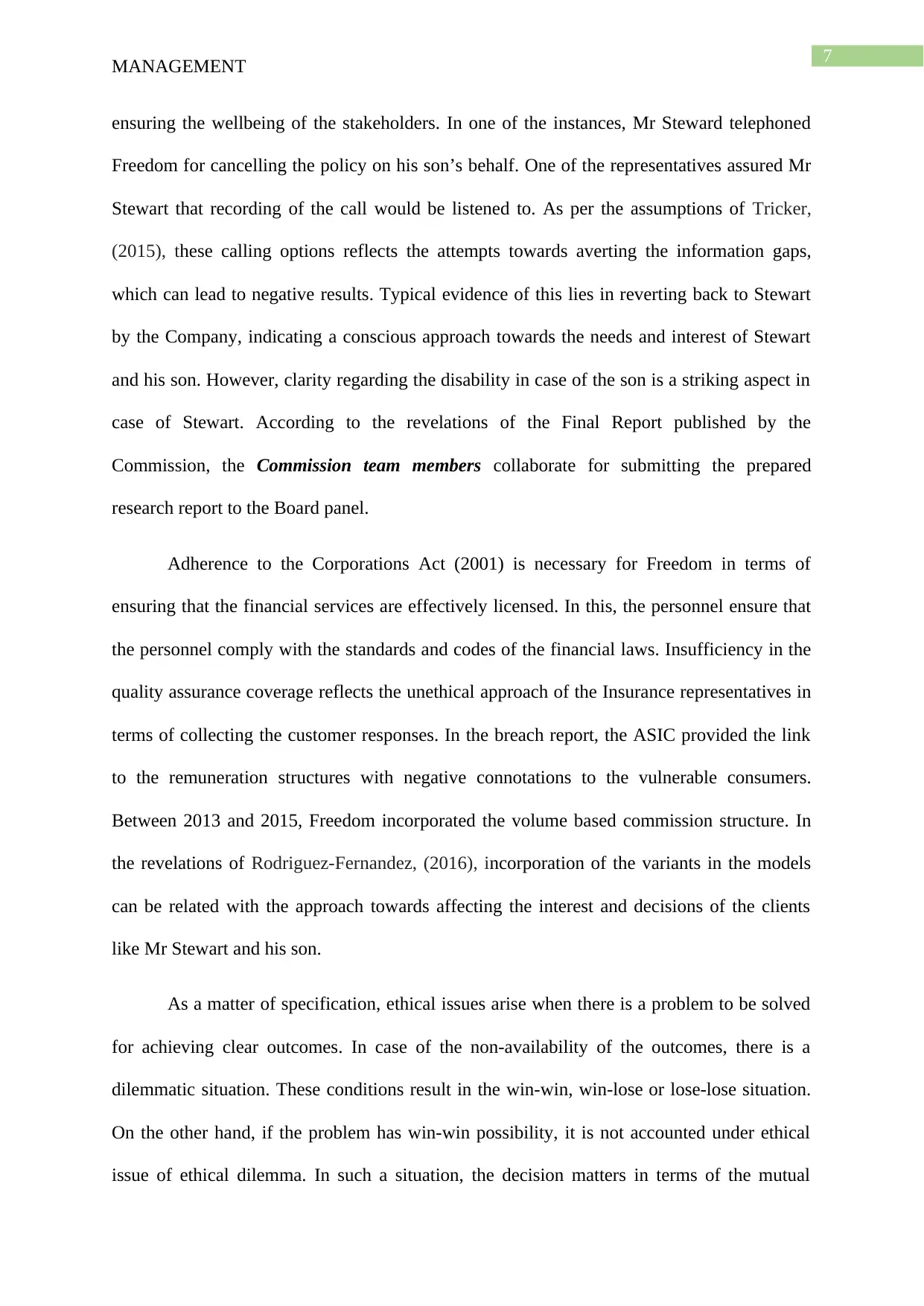
7
MANAGEMENT
ensuring the wellbeing of the stakeholders. In one of the instances, Mr Steward telephoned
Freedom for cancelling the policy on his son’s behalf. One of the representatives assured Mr
Stewart that recording of the call would be listened to. As per the assumptions of Tricker,
(2015), these calling options reflects the attempts towards averting the information gaps,
which can lead to negative results. Typical evidence of this lies in reverting back to Stewart
by the Company, indicating a conscious approach towards the needs and interest of Stewart
and his son. However, clarity regarding the disability in case of the son is a striking aspect in
case of Stewart. According to the revelations of the Final Report published by the
Commission, the Commission team members collaborate for submitting the prepared
research report to the Board panel.
Adherence to the Corporations Act (2001) is necessary for Freedom in terms of
ensuring that the financial services are effectively licensed. In this, the personnel ensure that
the personnel comply with the standards and codes of the financial laws. Insufficiency in the
quality assurance coverage reflects the unethical approach of the Insurance representatives in
terms of collecting the customer responses. In the breach report, the ASIC provided the link
to the remuneration structures with negative connotations to the vulnerable consumers.
Between 2013 and 2015, Freedom incorporated the volume based commission structure. In
the revelations of Rodriguez-Fernandez, (2016), incorporation of the variants in the models
can be related with the approach towards affecting the interest and decisions of the clients
like Mr Stewart and his son.
As a matter of specification, ethical issues arise when there is a problem to be solved
for achieving clear outcomes. In case of the non-availability of the outcomes, there is a
dilemmatic situation. These conditions result in the win-win, win-lose or lose-lose situation.
On the other hand, if the problem has win-win possibility, it is not accounted under ethical
issue of ethical dilemma. In such a situation, the decision matters in terms of the mutual
MANAGEMENT
ensuring the wellbeing of the stakeholders. In one of the instances, Mr Steward telephoned
Freedom for cancelling the policy on his son’s behalf. One of the representatives assured Mr
Stewart that recording of the call would be listened to. As per the assumptions of Tricker,
(2015), these calling options reflects the attempts towards averting the information gaps,
which can lead to negative results. Typical evidence of this lies in reverting back to Stewart
by the Company, indicating a conscious approach towards the needs and interest of Stewart
and his son. However, clarity regarding the disability in case of the son is a striking aspect in
case of Stewart. According to the revelations of the Final Report published by the
Commission, the Commission team members collaborate for submitting the prepared
research report to the Board panel.
Adherence to the Corporations Act (2001) is necessary for Freedom in terms of
ensuring that the financial services are effectively licensed. In this, the personnel ensure that
the personnel comply with the standards and codes of the financial laws. Insufficiency in the
quality assurance coverage reflects the unethical approach of the Insurance representatives in
terms of collecting the customer responses. In the breach report, the ASIC provided the link
to the remuneration structures with negative connotations to the vulnerable consumers.
Between 2013 and 2015, Freedom incorporated the volume based commission structure. In
the revelations of Rodriguez-Fernandez, (2016), incorporation of the variants in the models
can be related with the approach towards affecting the interest and decisions of the clients
like Mr Stewart and his son.
As a matter of specification, ethical issues arise when there is a problem to be solved
for achieving clear outcomes. In case of the non-availability of the outcomes, there is a
dilemmatic situation. These conditions result in the win-win, win-lose or lose-lose situation.
On the other hand, if the problem has win-win possibility, it is not accounted under ethical
issue of ethical dilemma. In such a situation, the decision matters in terms of the mutual
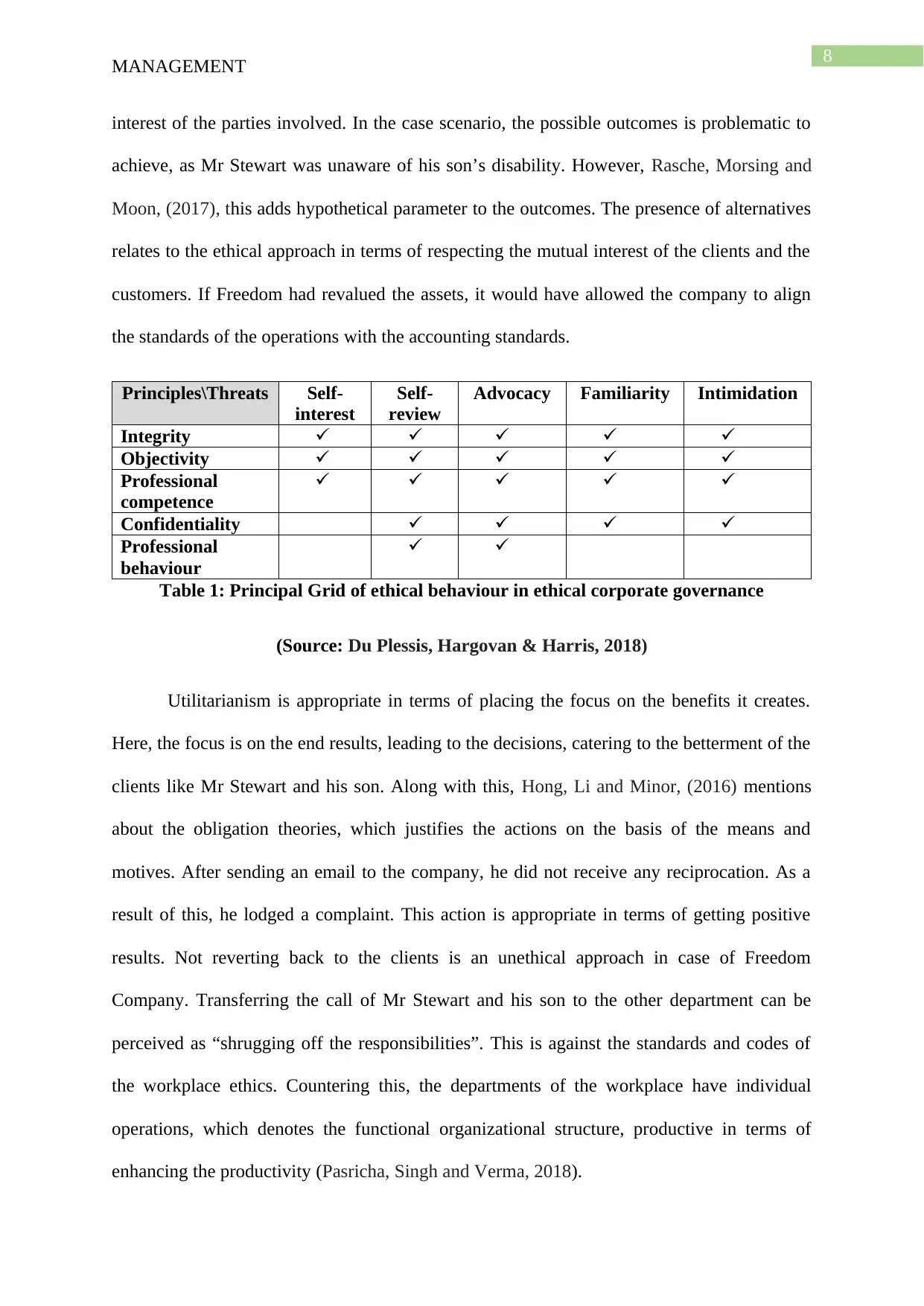
8
MANAGEMENT
interest of the parties involved. In the case scenario, the possible outcomes is problematic to
achieve, as Mr Stewart was unaware of his son’s disability. However, Rasche, Morsing and
Moon, (2017), this adds hypothetical parameter to the outcomes. The presence of alternatives
relates to the ethical approach in terms of respecting the mutual interest of the clients and the
customers. If Freedom had revalued the assets, it would have allowed the company to align
the standards of the operations with the accounting standards.
Principles\Threats Self-
interest
Self-
review
Advocacy Familiarity Intimidation
Integrity
Objectivity
Professional
competence
Confidentiality
Professional
behaviour
Table 1: Principal Grid of ethical behaviour in ethical corporate governance
(Source: Du Plessis, Hargovan & Harris, 2018)
Utilitarianism is appropriate in terms of placing the focus on the benefits it creates.
Here, the focus is on the end results, leading to the decisions, catering to the betterment of the
clients like Mr Stewart and his son. Along with this, Hong, Li and Minor, (2016) mentions
about the obligation theories, which justifies the actions on the basis of the means and
motives. After sending an email to the company, he did not receive any reciprocation. As a
result of this, he lodged a complaint. This action is appropriate in terms of getting positive
results. Not reverting back to the clients is an unethical approach in case of Freedom
Company. Transferring the call of Mr Stewart and his son to the other department can be
perceived as “shrugging off the responsibilities”. This is against the standards and codes of
the workplace ethics. Countering this, the departments of the workplace have individual
operations, which denotes the functional organizational structure, productive in terms of
enhancing the productivity (Pasricha, Singh and Verma, 2018).
MANAGEMENT
interest of the parties involved. In the case scenario, the possible outcomes is problematic to
achieve, as Mr Stewart was unaware of his son’s disability. However, Rasche, Morsing and
Moon, (2017), this adds hypothetical parameter to the outcomes. The presence of alternatives
relates to the ethical approach in terms of respecting the mutual interest of the clients and the
customers. If Freedom had revalued the assets, it would have allowed the company to align
the standards of the operations with the accounting standards.
Principles\Threats Self-
interest
Self-
review
Advocacy Familiarity Intimidation
Integrity
Objectivity
Professional
competence
Confidentiality
Professional
behaviour
Table 1: Principal Grid of ethical behaviour in ethical corporate governance
(Source: Du Plessis, Hargovan & Harris, 2018)
Utilitarianism is appropriate in terms of placing the focus on the benefits it creates.
Here, the focus is on the end results, leading to the decisions, catering to the betterment of the
clients like Mr Stewart and his son. Along with this, Hong, Li and Minor, (2016) mentions
about the obligation theories, which justifies the actions on the basis of the means and
motives. After sending an email to the company, he did not receive any reciprocation. As a
result of this, he lodged a complaint. This action is appropriate in terms of getting positive
results. Not reverting back to the clients is an unethical approach in case of Freedom
Company. Transferring the call of Mr Stewart and his son to the other department can be
perceived as “shrugging off the responsibilities”. This is against the standards and codes of
the workplace ethics. Countering this, the departments of the workplace have individual
operations, which denotes the functional organizational structure, productive in terms of
enhancing the productivity (Pasricha, Singh and Verma, 2018).
⊘ This is a preview!⊘
Do you want full access?
Subscribe today to unlock all pages.

Trusted by 1+ million students worldwide
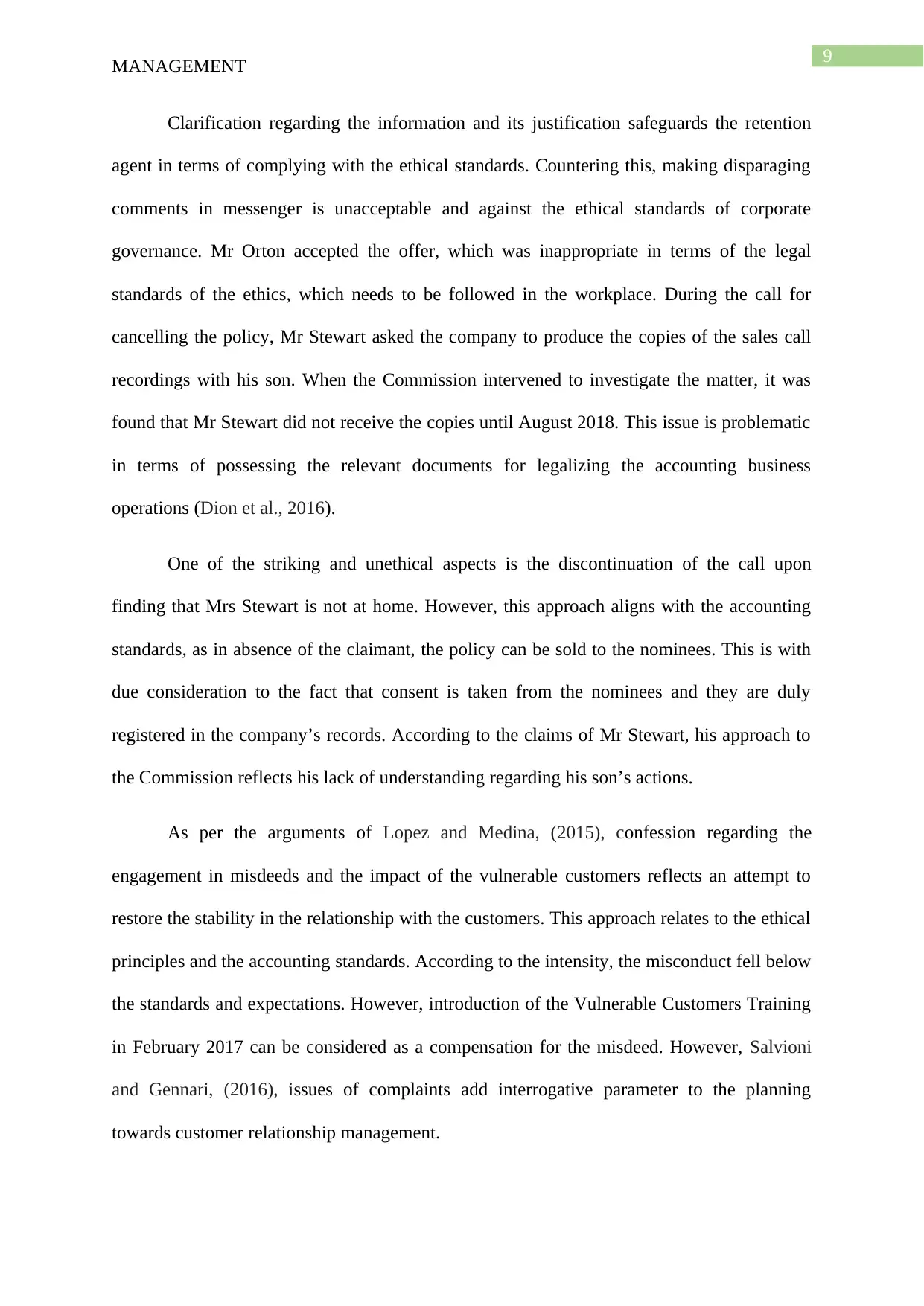
9
MANAGEMENT
Clarification regarding the information and its justification safeguards the retention
agent in terms of complying with the ethical standards. Countering this, making disparaging
comments in messenger is unacceptable and against the ethical standards of corporate
governance. Mr Orton accepted the offer, which was inappropriate in terms of the legal
standards of the ethics, which needs to be followed in the workplace. During the call for
cancelling the policy, Mr Stewart asked the company to produce the copies of the sales call
recordings with his son. When the Commission intervened to investigate the matter, it was
found that Mr Stewart did not receive the copies until August 2018. This issue is problematic
in terms of possessing the relevant documents for legalizing the accounting business
operations (Dion et al., 2016).
One of the striking and unethical aspects is the discontinuation of the call upon
finding that Mrs Stewart is not at home. However, this approach aligns with the accounting
standards, as in absence of the claimant, the policy can be sold to the nominees. This is with
due consideration to the fact that consent is taken from the nominees and they are duly
registered in the company’s records. According to the claims of Mr Stewart, his approach to
the Commission reflects his lack of understanding regarding his son’s actions.
As per the arguments of Lopez and Medina, (2015), confession regarding the
engagement in misdeeds and the impact of the vulnerable customers reflects an attempt to
restore the stability in the relationship with the customers. This approach relates to the ethical
principles and the accounting standards. According to the intensity, the misconduct fell below
the standards and expectations. However, introduction of the Vulnerable Customers Training
in February 2017 can be considered as a compensation for the misdeed. However, Salvioni
and Gennari, (2016), issues of complaints add interrogative parameter to the planning
towards customer relationship management.
MANAGEMENT
Clarification regarding the information and its justification safeguards the retention
agent in terms of complying with the ethical standards. Countering this, making disparaging
comments in messenger is unacceptable and against the ethical standards of corporate
governance. Mr Orton accepted the offer, which was inappropriate in terms of the legal
standards of the ethics, which needs to be followed in the workplace. During the call for
cancelling the policy, Mr Stewart asked the company to produce the copies of the sales call
recordings with his son. When the Commission intervened to investigate the matter, it was
found that Mr Stewart did not receive the copies until August 2018. This issue is problematic
in terms of possessing the relevant documents for legalizing the accounting business
operations (Dion et al., 2016).
One of the striking and unethical aspects is the discontinuation of the call upon
finding that Mrs Stewart is not at home. However, this approach aligns with the accounting
standards, as in absence of the claimant, the policy can be sold to the nominees. This is with
due consideration to the fact that consent is taken from the nominees and they are duly
registered in the company’s records. According to the claims of Mr Stewart, his approach to
the Commission reflects his lack of understanding regarding his son’s actions.
As per the arguments of Lopez and Medina, (2015), confession regarding the
engagement in misdeeds and the impact of the vulnerable customers reflects an attempt to
restore the stability in the relationship with the customers. This approach relates to the ethical
principles and the accounting standards. According to the intensity, the misconduct fell below
the standards and expectations. However, introduction of the Vulnerable Customers Training
in February 2017 can be considered as a compensation for the misdeed. However, Salvioni
and Gennari, (2016), issues of complaints add interrogative parameter to the planning
towards customer relationship management.
Paraphrase This Document
Need a fresh take? Get an instant paraphrase of this document with our AI Paraphraser
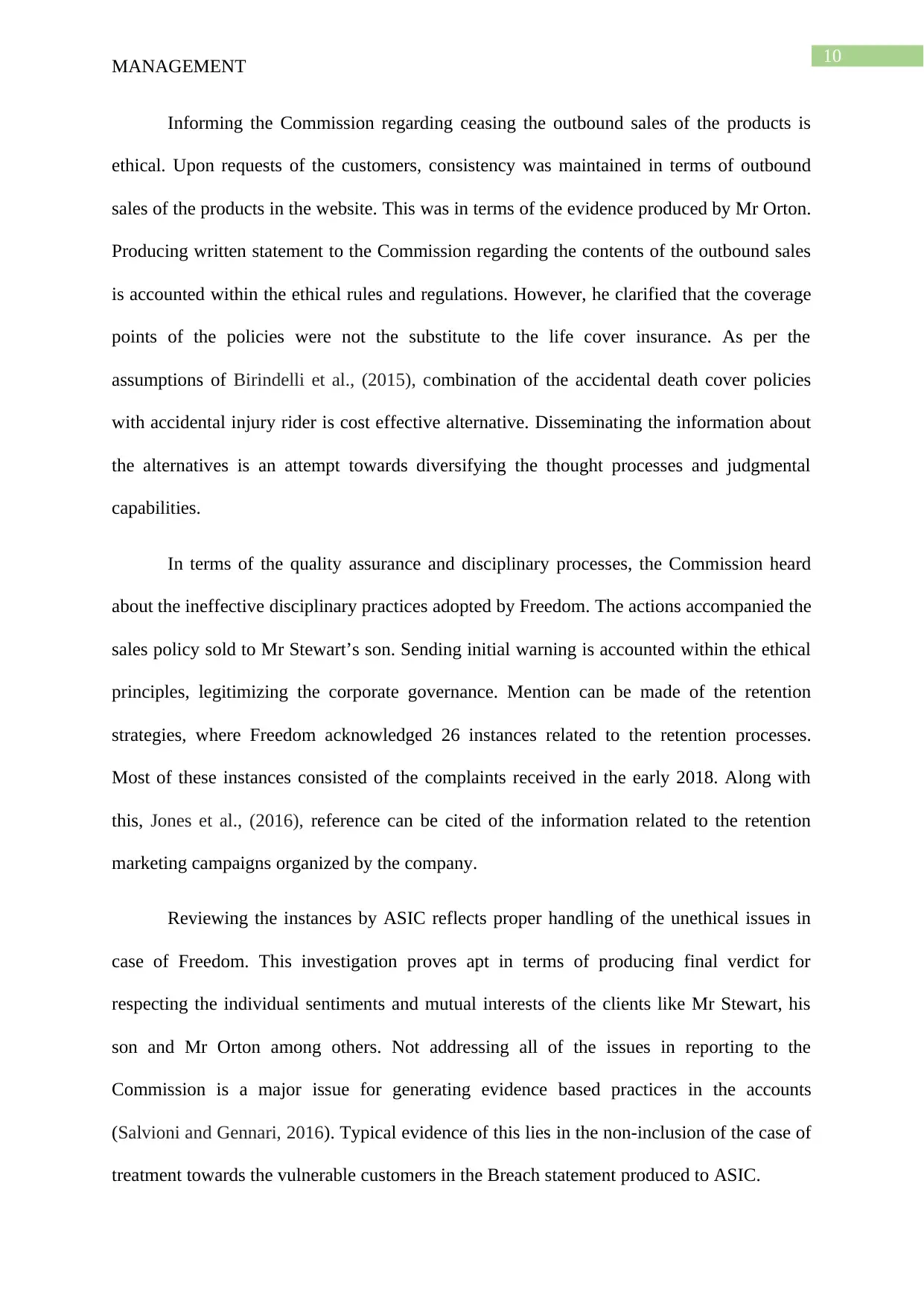
10
MANAGEMENT
Informing the Commission regarding ceasing the outbound sales of the products is
ethical. Upon requests of the customers, consistency was maintained in terms of outbound
sales of the products in the website. This was in terms of the evidence produced by Mr Orton.
Producing written statement to the Commission regarding the contents of the outbound sales
is accounted within the ethical rules and regulations. However, he clarified that the coverage
points of the policies were not the substitute to the life cover insurance. As per the
assumptions of Birindelli et al., (2015), combination of the accidental death cover policies
with accidental injury rider is cost effective alternative. Disseminating the information about
the alternatives is an attempt towards diversifying the thought processes and judgmental
capabilities.
In terms of the quality assurance and disciplinary processes, the Commission heard
about the ineffective disciplinary practices adopted by Freedom. The actions accompanied the
sales policy sold to Mr Stewart’s son. Sending initial warning is accounted within the ethical
principles, legitimizing the corporate governance. Mention can be made of the retention
strategies, where Freedom acknowledged 26 instances related to the retention processes.
Most of these instances consisted of the complaints received in the early 2018. Along with
this, Jones et al., (2016), reference can be cited of the information related to the retention
marketing campaigns organized by the company.
Reviewing the instances by ASIC reflects proper handling of the unethical issues in
case of Freedom. This investigation proves apt in terms of producing final verdict for
respecting the individual sentiments and mutual interests of the clients like Mr Stewart, his
son and Mr Orton among others. Not addressing all of the issues in reporting to the
Commission is a major issue for generating evidence based practices in the accounts
(Salvioni and Gennari, 2016). Typical evidence of this lies in the non-inclusion of the case of
treatment towards the vulnerable customers in the Breach statement produced to ASIC.
MANAGEMENT
Informing the Commission regarding ceasing the outbound sales of the products is
ethical. Upon requests of the customers, consistency was maintained in terms of outbound
sales of the products in the website. This was in terms of the evidence produced by Mr Orton.
Producing written statement to the Commission regarding the contents of the outbound sales
is accounted within the ethical rules and regulations. However, he clarified that the coverage
points of the policies were not the substitute to the life cover insurance. As per the
assumptions of Birindelli et al., (2015), combination of the accidental death cover policies
with accidental injury rider is cost effective alternative. Disseminating the information about
the alternatives is an attempt towards diversifying the thought processes and judgmental
capabilities.
In terms of the quality assurance and disciplinary processes, the Commission heard
about the ineffective disciplinary practices adopted by Freedom. The actions accompanied the
sales policy sold to Mr Stewart’s son. Sending initial warning is accounted within the ethical
principles, legitimizing the corporate governance. Mention can be made of the retention
strategies, where Freedom acknowledged 26 instances related to the retention processes.
Most of these instances consisted of the complaints received in the early 2018. Along with
this, Jones et al., (2016), reference can be cited of the information related to the retention
marketing campaigns organized by the company.
Reviewing the instances by ASIC reflects proper handling of the unethical issues in
case of Freedom. This investigation proves apt in terms of producing final verdict for
respecting the individual sentiments and mutual interests of the clients like Mr Stewart, his
son and Mr Orton among others. Not addressing all of the issues in reporting to the
Commission is a major issue for generating evidence based practices in the accounts
(Salvioni and Gennari, 2016). Typical evidence of this lies in the non-inclusion of the case of
treatment towards the vulnerable customers in the Breach statement produced to ASIC.
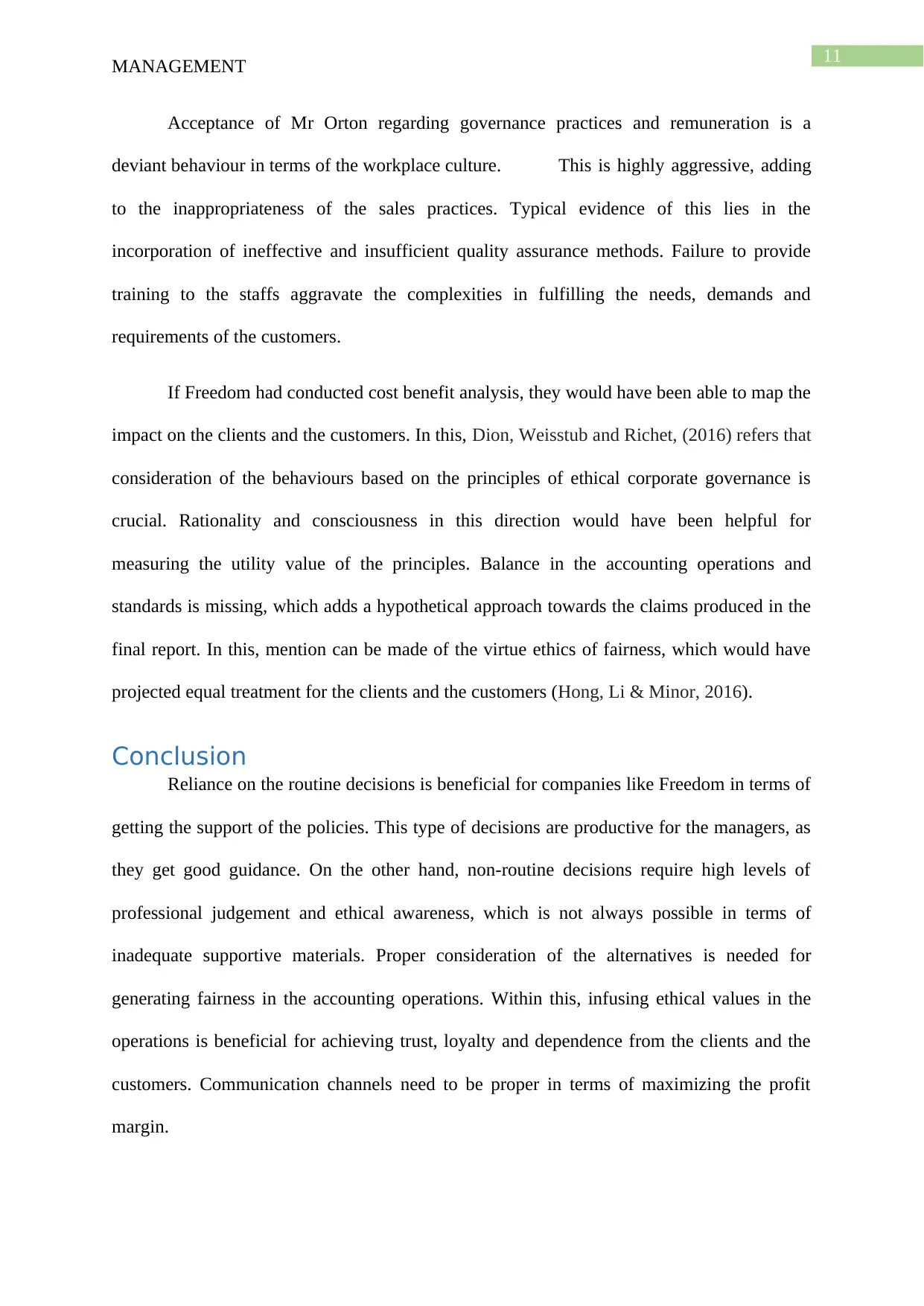
11
MANAGEMENT
Acceptance of Mr Orton regarding governance practices and remuneration is a
deviant behaviour in terms of the workplace culture. This is highly aggressive, adding
to the inappropriateness of the sales practices. Typical evidence of this lies in the
incorporation of ineffective and insufficient quality assurance methods. Failure to provide
training to the staffs aggravate the complexities in fulfilling the needs, demands and
requirements of the customers.
If Freedom had conducted cost benefit analysis, they would have been able to map the
impact on the clients and the customers. In this, Dion, Weisstub and Richet, (2016) refers that
consideration of the behaviours based on the principles of ethical corporate governance is
crucial. Rationality and consciousness in this direction would have been helpful for
measuring the utility value of the principles. Balance in the accounting operations and
standards is missing, which adds a hypothetical approach towards the claims produced in the
final report. In this, mention can be made of the virtue ethics of fairness, which would have
projected equal treatment for the clients and the customers (Hong, Li & Minor, 2016).
Conclusion
Reliance on the routine decisions is beneficial for companies like Freedom in terms of
getting the support of the policies. This type of decisions are productive for the managers, as
they get good guidance. On the other hand, non-routine decisions require high levels of
professional judgement and ethical awareness, which is not always possible in terms of
inadequate supportive materials. Proper consideration of the alternatives is needed for
generating fairness in the accounting operations. Within this, infusing ethical values in the
operations is beneficial for achieving trust, loyalty and dependence from the clients and the
customers. Communication channels need to be proper in terms of maximizing the profit
margin.
MANAGEMENT
Acceptance of Mr Orton regarding governance practices and remuneration is a
deviant behaviour in terms of the workplace culture. This is highly aggressive, adding
to the inappropriateness of the sales practices. Typical evidence of this lies in the
incorporation of ineffective and insufficient quality assurance methods. Failure to provide
training to the staffs aggravate the complexities in fulfilling the needs, demands and
requirements of the customers.
If Freedom had conducted cost benefit analysis, they would have been able to map the
impact on the clients and the customers. In this, Dion, Weisstub and Richet, (2016) refers that
consideration of the behaviours based on the principles of ethical corporate governance is
crucial. Rationality and consciousness in this direction would have been helpful for
measuring the utility value of the principles. Balance in the accounting operations and
standards is missing, which adds a hypothetical approach towards the claims produced in the
final report. In this, mention can be made of the virtue ethics of fairness, which would have
projected equal treatment for the clients and the customers (Hong, Li & Minor, 2016).
Conclusion
Reliance on the routine decisions is beneficial for companies like Freedom in terms of
getting the support of the policies. This type of decisions are productive for the managers, as
they get good guidance. On the other hand, non-routine decisions require high levels of
professional judgement and ethical awareness, which is not always possible in terms of
inadequate supportive materials. Proper consideration of the alternatives is needed for
generating fairness in the accounting operations. Within this, infusing ethical values in the
operations is beneficial for achieving trust, loyalty and dependence from the clients and the
customers. Communication channels need to be proper in terms of maximizing the profit
margin.
⊘ This is a preview!⊘
Do you want full access?
Subscribe today to unlock all pages.

Trusted by 1+ million students worldwide
1 out of 16
Related Documents
Your All-in-One AI-Powered Toolkit for Academic Success.
+13062052269
info@desklib.com
Available 24*7 on WhatsApp / Email
![[object Object]](/_next/static/media/star-bottom.7253800d.svg)
Unlock your academic potential
Copyright © 2020–2026 A2Z Services. All Rights Reserved. Developed and managed by ZUCOL.





